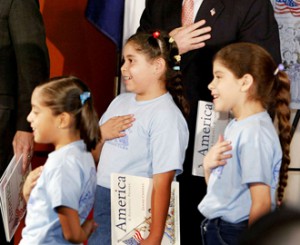AHA Will Appeal

A Massachusetts court has ruled against a humanist family in their challenge to the “under God” wording of the Pledge of Allegiance to the Flag. The plaintiffs plan to appeal the ruling.
The lawsuit, filed by the American Humanist Association and a Massachusetts family, is the first of its kind seeking equal rights for atheists-humanists while ignoring traditional First Amendment Establishment Clause arguments. It seeks a declaration that the daily classroom practice of recitation of the Pledge of Allegiance to the Flag—in the version that includes an affirmation that the nation is “under God”—violates state nondiscrimination law. In Massachusetts, both the state constitution and state statute prohibit discrimination based on religion.
“No child should go to school every day, from kindergarten to grade twelve, to be faced with an exercise that defines patriotism according to religious belief,” said the plaintiffs’ attorney David Niose, who is also AHA president. “If conducting a daily classroom exercise that marginalizes one religious group while exalting another does not violate basic principles of equal rights and nondiscrimination, then I don’t know what does.”
The Massachusetts case, while not challenging the federal statute that added “under God” language to the Pledge in 1954, argues that states nevertheless can have a right and a duty to protect religious minorities that are marginalized by such exclusionary language.
“If the federal government decides to write a discriminatory Pledge, the Massachusetts Constitution nevertheless protects children in the Commonwealth from the discrimination that would occur from daily recitation of the Pledge in classrooms,” Niose said.
Niose pointed out that the Pledge exercise is a daily indoctrination, not just a harmless ceremony. “The flag-salute is how we define patriotism for children on a daily basis,” he said. “When we define patriotism with a religious truth claim—that the nation is in fact under a god—we define nonbelievers as less patriotic.”
A copy of the ruling can be found here.
The American Humanist Association supported the case through its legal arm, the Appignani Humanist Legal Center, which works to defend the rights of humanists through the court system.
